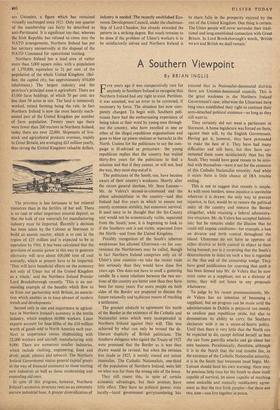A Southern Viewpoint
By BRIAN INGLIS
FIVE years ago it was comparatively rare for anybody in Southern Ireland to recognise that Northern Ireland had any right to exist. Partition, it was assumed, was an error to be corrected, if necessary by force. The situation has now com- pletely changed. To begin with, Southern poli- ticians have had the embarrassing experience of being taken at their word by young men through- out the country, who have enrolled in one or other of the illegal republican organisations and gone to blow up power stations or barracks in the North. Useless for the politicians to say the cam- paign is ill-advised or premature : the young republican replies that the country has waited thirty-five years for the politicians to find a solution and that if they cannot, or will not, lead the way, they must step out of it.
The politicians of the South, too, have become aware of their country's weakness. Shortly after the recent general election, Mr. Sean Lemass- Mr. de Valera's second-in-command and the ablest administfator in the country—said that Ireland had five years in which to ensure not merely economic stability, but economic survival.
It once to be thought that the Six-County unit would not be economically viable, separated from the South; now, it is beginning to look as if the Southern unit is not viable, separated from the North—and from the United Kingdom.
Possibly recognition of the South's inherent weaknesses has allowed Ulstermen—as for con- venience the Northerners may be called, though in fact Northern Ireland comprises only six of Ulster's nine counties—to take the recent raids less seriously than they would have done five years ago. One does not have to snuff a guttering candle. In a sense relations between the two sec- tions of the country are better now than they have been for many years. Far more people on both sides of the Border are prepared to discuss the future rationally and to discuss means of reaching a settlement.
The greatest obstacle to agreement lies north of the Border in the existence of the Catholic and Nationalist areas which were incorporated in Northern Ireland against their will. This was achieved by what can only be termed the de- liberate duplicity of British politicians. The Southern delegates who signed the Treaty of 1921 were promised that the Border as it was then drawn would be revised; but when the revision was made in 1925, it merely ironed out minor anomalies, The Catholic Nationalists, one-third of the population of Northern Ireland, were left on what was for them the wrong side of the fence.
They still resent this, in spite of certain economic advantages, but their protests have little effect. They have no political power, even locally—local government gerrymandering has ensured that in Nationalist-dominated districts there are Unionist-dominated councils. This is the great weakness in the Northern Ireland Government's case; otherwise the Ulstermen have long since established their right to continue their semi-detached political existence—so long as they still want to.
They certainly did not want a parliament at Stormont. A home legislature was forced on them, against their will, by the English Government. Having got it, however, they have proceeded to make the best of it. They have had many difficulties and still have, but they have sur- mounted them more satisfactorily than has the South. They would have good reason to be satis- fied with themselves—were it not for the existence of this Catholic Nationalist minority. And while it exists there is little chance of IRA trouble ending.
This is not to suggest that remedy is simple. As with most borders, some injustice is inevitable wherever it is drawn; the only way to prevent injustice, in fact, would be to restore the political unity of the country and remove the Border altogether, while retaining a federal administra- tive structure. Mr. de Valera has accepted federal- ism; but he remains under the illusion that he could still impose conditions—for example, a ban on divorce and birth control throughout the island. Ulstermen do not have to approve of either divorce or birth control to object to their being banned; nor is it surprising that the South's determination to insist on such a ban is regarded as the thin end of the censorship wedge. They have good justification for asserting that until it has been dinned into Mr. de Valera that he now must come as a suppliant, not as a dictator of terms, they will not listen to any proposals whatsoever.
To judge by his recent pronouncements, Mr. de Valera has no intention of becoming a suppliant; but no progress can be made until the administration in Dublin is prepared not merely to swallow past republican pride, but also to demonstrate its ability to carry the Southern electorate with it on a union-of-hearts policy. Until then there is very little that the North can be expected to do, except defend herself as best she can from guerrilla attacks and go about her own business. Paradoxically, therefore, although it is in the North that the real trouble lies, in the existence of the Catholic Nationalist minority, it is in the South that treatment must begin. Mr. Lemass should heed his own warning; there may be precious little time for the South to show itself capable of survival, let alone capable of reaching some amicable and mutually satisfactory agree- ment so that the two Irish peoples—for there are two, now—can live together in peace.










































 Previous page
Previous page